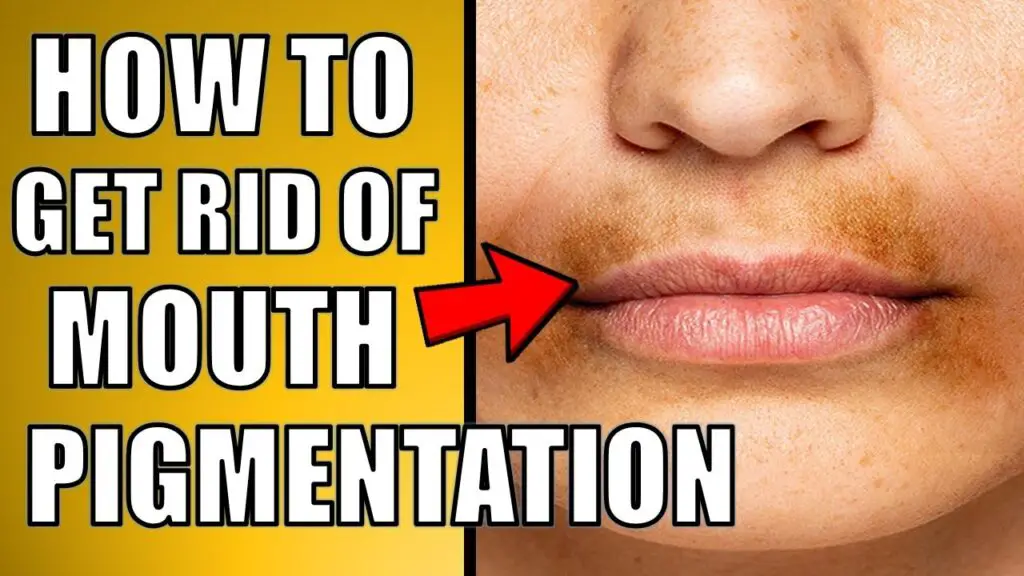As we grow older, we can expect our skin to get less supple, less elastic, and possibly even a little discolored. This is a perfectly normal symptom of aging, and it's nothing for anyone to be ashamed of.
However, excess pigmentation around the mouth (sometimes called hyperpigmentation) can be noticeable and a little embarrassing. Pigmentation around the mouth shows up as dark patches or coloration around the lips or at the corners of the mouth. It can range from vividly colored to barely noticeable. This pigmentation isn't painful, but some people consider it unsightly.
If you have pigmentation around your mouth and you want to get rid of it, what can you do? Is it a health concern - should you be worried?
In this article, we'll discuss some causes of pigmentation around the mouth, as well as some natural treatments you can try at home. We'll also discuss when to see a doctor - or if you even need to see one at all.
What Causes Pigmentation Around The Mouth?
There can be more than one cause of pigmentation around the mouth. The pigmentation is usually dark, and ranges from barely noticeable to extremely obvious. While pigmentation like this is usually not a cause for concern, it's worth trying to figure out any underlying causes of pigmentation, especially if the changes are sudden and very vivid.
So, let's take a look at a few possible causes of pigmentation around the mouth.
Hyperpigmentation
One of the most common causes of dark skin around the mouth is hyperpigmentation. Hyperpigmentation occurs due to the overproduction of melanin - the substance that gives our skin color and protects us from dangerous UV rays - in certain patches of skin. This makes the skin look darker or discolored.
Hyperpigmentation can affect just about anyone, of any age or skin type. Smaller areas of hyperpigmentation can form anywhere on the skin, but more likely in areas exposed most often to the sun. The includes the skin on your face, arms, neck, and hands.
Medications
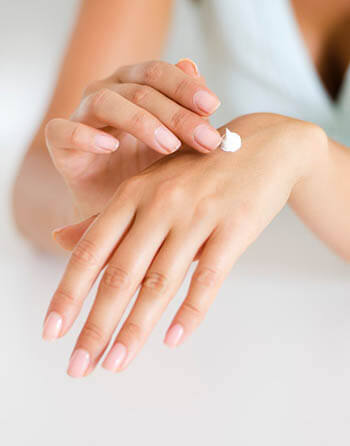
Some medications can cause excess pigmentation in the skin. For example, some medications for depression or malaria could cause pigmentation around the mouth, as can some ointments or creams. With these medications, hyperpigmentation is known as a possible side effect.
If you think your medication is causing hyperpigmentation, it's important not to simply stop taking your medication, at least not until instructed to do so by your doctor. Talk to your doctor first, and you may be able to come off the medication gradually, or your doctor may prescribe an alternative medication. Hyperpigmentation is usually an unpleasant but harmless side effect.
Weather Conditions
We've briefly discussed how overexposure to the sun can cause hyperpigmentation of the skin, and cold weather can also be a cause. For example, repeatedly licking your lips in very cold weather can leave the skin around your mouth damp and vulnerable, leading to the skin looking discolored. Sunburn or cold injuries to the skin around your mouth can lead to hyperpigmentation, or a discoloration that looks like hyperpigmentation.
Vitamin Deficiencies
You might be surprised to learn that deficiencies in vitamins B12 and D can cause hyperpigmentation. A deficiency in vitamin D, usually absorbed via sunlight, is another common cause of hyperpigmentation. You can get around this by spending more time in the sun, or possibly taking a vitamin D or B12 supplement. Vitamin D deficiencies can be more common in people who don't spend a lot of time in sunlight (for example, office workers who only work indoors for long hours).
Skin Trauma
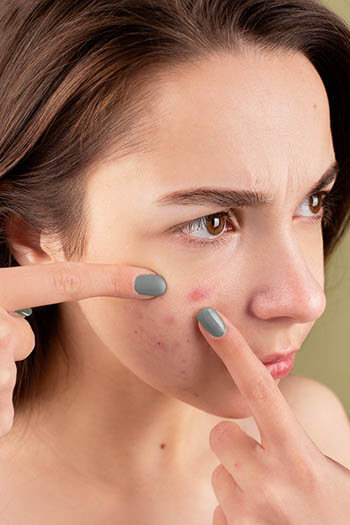
Bruises, trauma, acne scars, and more can all give the appearance of hyperpigmentation. If your skin discoloration is caused by skin trauma, the discoloration will fade as the skin heals.
Natural Treatments to Get Rid Of Pigmentation Around The Mouth
Pinpointing the cause of the excess pigmentation around your mouth can go a long way to dealing with the problem. For example, discoloration caused by skin trauma is likely to heal itself over time, and discoloration caused by medication will likely go away if you stop taking the medication. However, if there's not much you can do to treat the root cause of the hyperpigmentation, here are a few natural treatments you can try at home to deal with excess pigmentation around the mouth.
Medically Prescribed Ointments
There is a chance that you might need to visit a dermatologist. For example, if your hyperpigmentation is caused by medication that you need to keep taking, your doctor might recommend a cream or ointment to deal with the side effects of the medication. Ointments that contain hydroquinone are commonly prescribed.
Hydroquinone slows down pigment production, targeting the cells that create the pigment. This can help dark spots to fade more quickly.
Exfoliating
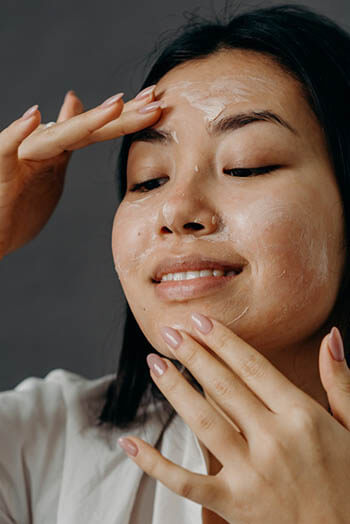
Exfoliating, if done correctly, is very good for our skin. It cleans away dead skin cells and leaves fresher, brighter skin underneath. Exfoliating is a good way to clear away patches of dark skin around the mouth, but it should be done carefully. Rough or abrasive exfoliating can actually damage the skin, making the discoloration worse.
Use a gentle exfoliator around your mouth, preferably one that has skin-brightening properties. Don't press too hard or scrub too vigorously. Exfoliating is something you might want to discuss with a dermatologist, and possibly ask for suggestions.
Skin Brightening Creams
Skin brightening creams can be very effective against hyperpigmentation. However, like all creams and ointments, the ingredient to success is in the - well, in the ingredients. Look for products like vitamin C, licorice extract, curcumin, kojic acid, or grape seed extract in the ingredients list.
If you have sensitive skin, however, you might want to beware of some ingredients like kojic acid.
Lemon Juice

Citric acid can also be effective in lightening patches of dark skin, which makes lemon juice good for dealing with hyperpigmentation. All you need is a lemon.
Cut the lemon in half, and rub the half on the dark skin around your mouth for around ten to fifteen minutes. When you're finished, rinse your face well. You can also use lemon juice in homemade face masks.
Oatmeal Scrubs
Oatmeal works as a gentle exfoliator. You can make an oatmeal scrub paste by mixing oatmeal, tomato pulp, and olive oil. Apply the mixture on your face (avoiding your eyes, of course) and rub in gentle, circular motions.
This helps the oatmeal to exfoliate and lighten the skin. You can use the scrub paste on your whole face or just on the area around your mouth, if you prefer.
Papaya

Papaya is full of vitamin C and vitamin A, making it great to eat and good for your skin. Take a few slices of papaya and blend thoroughly, adding a little rose water. This will make a thick paste, which you should spread over your face like a face mask. Let it sit on your skin for around half an hour, then wash off gently.
Aloe Vera
Aloe vera gels and ointments, or creams that contain aloe vera, can also work well to lighten patches of dark skin. In the case of severe hyperpigmentation, aloe vera capsules can help to ease hyperpigmentation. However, you shouldn't eat aloe vera gel from any other source!
Turmeric Powder and Rose Water
You can make a paste face mask with turmeric powder and rose water. Mix the two ingredients together to make a paste, and apply to your face. Pay special attention to the dark areas of your skin, especially around your mouth.
Let the paste sit on your skin for around ten minutes, then rinse off carefully and thoroughly. Be careful when you're mixing up this paste - turmeric can stain!
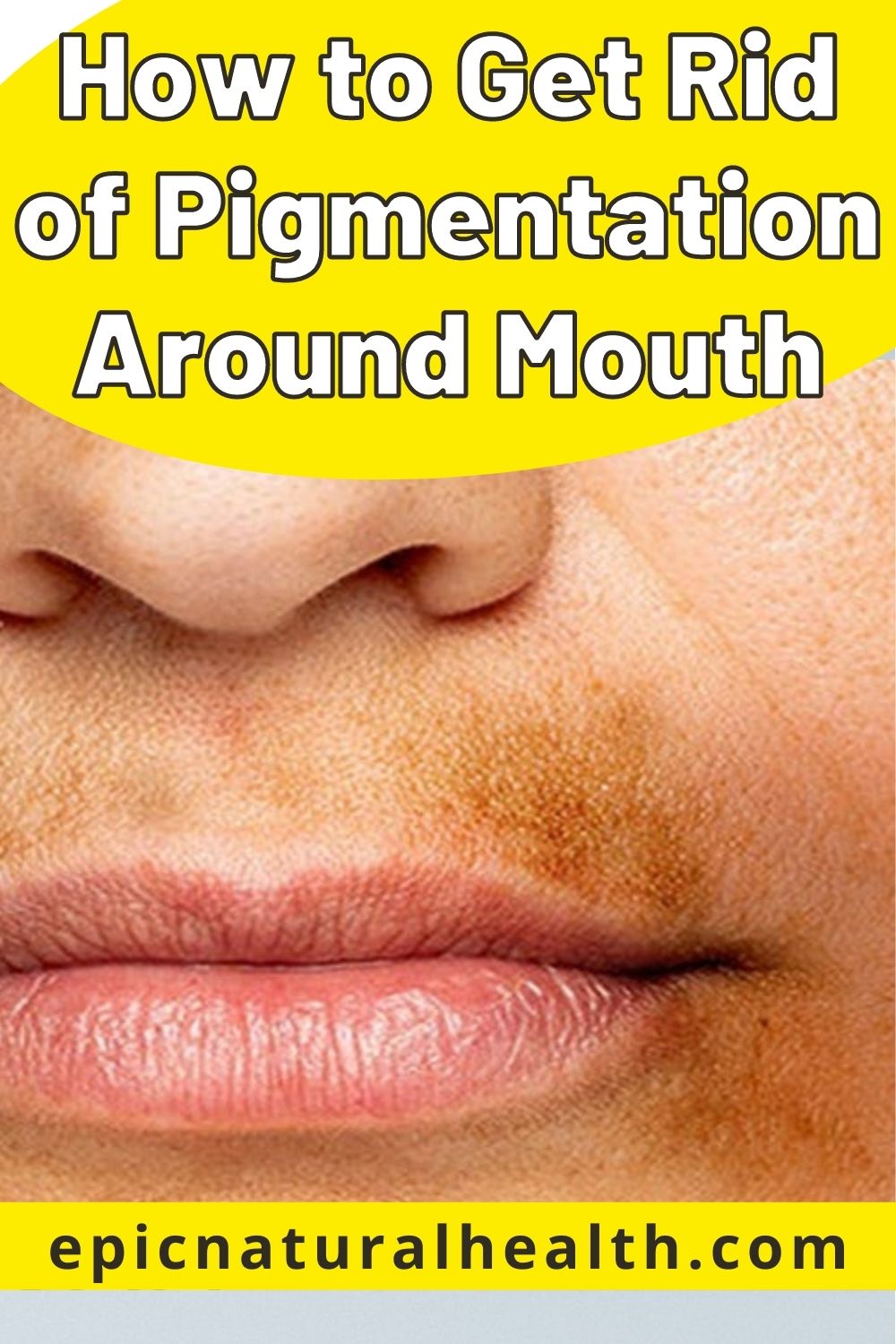
When To See a Doctor
Hyperpigmentation is very rarely a cause for concern. At worst, discoloration on the skin or around the mouth is just unsightly. In some cases, hyperpigmentation around the mouth can make skin look "dirty", due to patches that are darker than the rest of your skin. Hyperpigmentation isn't painful, and doesn't really damage the skin.
However, there may be occasions when you need to see a doctor. This is could because the pigmentation isn't hyperpigmentation at all, or is caused by something else. Here are a few signs and symptoms that could mean that it's time to visit a doctor.
If You Have Other Symptoms
If your hyperpigmentation appears at the same time as other physical symptoms, this could mean that the discoloration is connected to another condition. It could also mean that there's an underlying cause of the discoloration. For example, serious vitamin deficiencies (which can cause hyperpigmentation) can be dangerous to a person's health, and should be addressed as soon as possible.
If the discolored skin is inflamed or painful, or accompanied by other symptoms (headaches, nausea, etc.), it might be worth paying the doctor a visit.
If The Pigmentation Spreads
It can be worrying when an area of pigmentation starts to spread. Chances are, this spreading is just due to the pigmentation itself spreading. However, this could indicate that something is wrong - or at the very least, your attempts to deal with your hyperpigmentation at home are not working.
If The Pigmentation Changes Color or Texture
A change in color or texture of the pigmentation around the mouth means that something has changed. Your pigmented skin shouldn't feel any different from the rest of your skin. It's still healthy skin, just with a little more melanin than the rest of your skin.
If the pigmented area around your mouth is healing, it might change color, possibly lightening in color. This is fine, and perfectly normal. However, if the pigmentation intensifies, or changes color in some other way, it would be a good idea to visit a doctor to see what's going on.
For example, an increase in pigmentation after exfoliating could indicate that you are being too rough with your skin. Pressing or rubbing too hard while exfoliating can actually make hyperpigmentation worse. You may need to change your exfoliating habits, or try a new solution altogether.
If The Pigmentation Looks Like a Rash
If the pigmented area around your mouth is red, inflamed, rough to touch, or even painful, it could indicate that you aren't dealing with hyperpigmentation at all, but possibly a rash. Rashes and patches of inflamed skin can have lots of different causes, but it's important to figure out what's causing your rash and how to treat it.
Some rashes go away by themselves, but others don't. It would be good to visit a doctor to find out how to treat yours.
If The Pigmentation Is Especially Unsightly
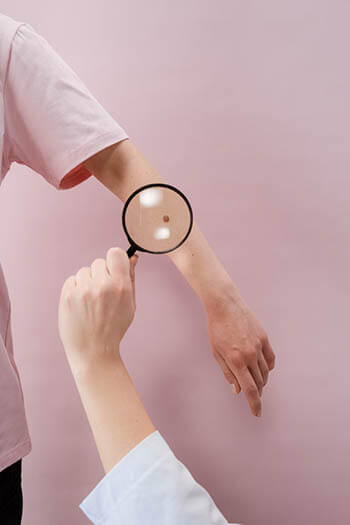
Sometimes, hyperpigmentation can be very vivid and unsightly. This can make a person feel uncomfortable or upset with their appearance. If you can't seem to treat your hyperpigmentation, visiting a doctor - or better yet, a dermatologist - can help you understand what is really causing your hyperpigmentation, and how to treat it.
The Bottom Line
Hyperpigmentation can be annoying and possibly unsightly, but for the most part, it's not harmful. Hyperpigmentation doesn't hurt or cause any sort of damage to your health. It's up to you whether you want to take steps to get rid of the pigmentation around your mouth, or whether you're content to simply leave it alone, and maybe even just let it fade by itself.

